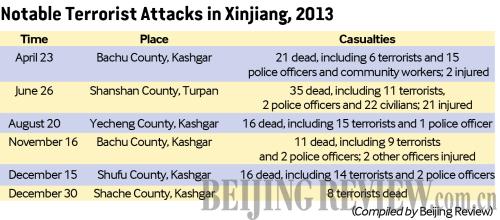|
Terrorists are constantly changing their methods since China has strict controls over guns and other hazardous articles, said Li Wei, Director of the Anti-Terrorism Research Center at the China Institutes of Contemporary International Relations.
"Terrorists mainly used large knives during attacks in Shanshan County and Hotan City earlier last year, while they used a car and gasoline during the Beijing attack," Li said. "The change of tactics has also led to anti-terrorism difficulties."
Searching for a resolution
In November last year, China declared plans to establish a national security committee. Experts believe the body will play an important role in countering rampant terrorism.
"It will have the power to coordinate government departments and organizations at the highest level so that they can respond to major emergencies and incidents that pose threats to national security, such as border conflicts and major terrorist attacks," Li said.
Three months before the decision was made, in August, China's central authorities established a group headed by Guo Shengkun, Minister of Public Security, to lead anti-terrorism efforts.
"The group can respond to terror attacks, but it can't eliminate the source of terrorism," Li said. "China desperately needs an organization, such as a national security committee, to develop long-term strategies to tackle the problem at its roots."
Although most experts have high expectations for the upcoming national security committee, they stress that more work needs to be done to eliminate terrorism. In their opinion, early discovery and early warnings are crucial in the handling of terrorist threats.
Mei suggested building an anti-terrorism information network. "Sound intelligence gathering and judgment through the network can help effectively prevent attacks," Mei said.
"An anti-terrorism law is also needed to beef up actions taken," Li noted. He added that solving various social problems should also be included in the framework of anti-terrorism efforts. "Social problems should not be available to be used as excuses by terrorists to recruit members," Li said.
After the United States withdraws its troops from Afghanistan in 2014, China and its neighbors to the west may face tougher security situations amid increased activity by extremists, experts warned.
Ruan Zongze, Vice President of the China Institute of International Studies, said that in 2014, the security situation in Afghanistan and its possible effect on regional stability are a major concern.
"The Taliban might take advantage of the withdrawal of U.S. troops. Moreover, Afghanistan is to hold its presidential election in May," Ruan noted. He warned that the possible resulting turmoil may jeopardize security and stability in the surrounding area.
Wang Lijiu, an expert at the China Institutes of Contemporary International Relations, believes that the Shanghai Cooperation Organization (SCO), which groups China, Russia, Kyrgyzstan, Kazakhstan, Tajikistan and Uzbekistan, can effectively coordinate anti-terrorism efforts between different countries in the region.
During the 13th Summit of the SCO in Bishkek, capital of Kyrgyzstan, in September last year, leaders of member states reiterated that cooperation on security, which has been one of its key tasks since the SCO was founded in Shanghai in 2001, will remain the bloc's top priority and their primary objective in the future.
After the Tiananmen Square attack, Chinese Premier Li Keqiang, when speaking at the 12th SCO Prime Ministers' Meeting in Tashkent, capital of Uzbekistan, in late November last year, called again for increased security cooperation in the region.
"No security, no progress. This applies to any country or region," Li said, adding that combating terrorism is the shared responsibility of all members of the SCO.
China has always been active in multilateral and bilateral anti-terrorism cooperation within the SCO framework. In 2013, it held joint anti-terrorism drills with Russia and Kyrgyzstan.
Anti-terrorism cooperation between China and its other neighbors along the western border are also progressing.
In late October last year, Pakistan banned three extremist organizations that help plan attacks in Xinjiang, including the ETIM, Pakistani newspaper The News reported.
In November 2013, China and India also conducted their first joint anti-terrorism exercise in five years in southwest China's Sichuan Province.
Email us at: yinpumin@bjreview.com

| 